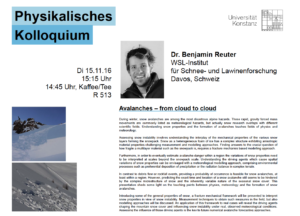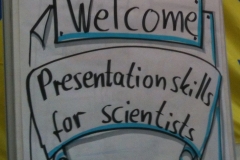 Konstanz jDPG-YM Section organized a specialized talk about a research topic which is not present at the University of Konstanz. The invited speaker was Dr. Benjamin Reuter from the WSL – Institute for snow and avalanche research SLF in Davos, Switzerland. The title of the talk was “Avalanches – from cloud to cloud”. The specialized talk was held in framework of the colloquium of the physical department of the University of Konstanz. In a very impressive way Dr. Reuter introduced the audience to avalanche research and common measurement and forecasting techniques. In the talk he presented some of the general properties of snow and a fracture mechanical framework to interpret snow properties in view of snow instability. He showed measurement techniques to obtain such measures in the field, but also modelling approaches. The presentation indicated that the application of this framework to real cases will reveal the driving agents shaping the mountain snow cover and influencing snow instability under real, observed meteorological conditions. Assessing the influence of those driving agents is the key to future numerical avalanche forecasting approaches.
Konstanz jDPG-YM Section organized a specialized talk about a research topic which is not present at the University of Konstanz. The invited speaker was Dr. Benjamin Reuter from the WSL – Institute for snow and avalanche research SLF in Davos, Switzerland. The title of the talk was “Avalanches – from cloud to cloud”. The specialized talk was held in framework of the colloquium of the physical department of the University of Konstanz. In a very impressive way Dr. Reuter introduced the audience to avalanche research and common measurement and forecasting techniques. In the talk he presented some of the general properties of snow and a fracture mechanical framework to interpret snow properties in view of snow instability. He showed measurement techniques to obtain such measures in the field, but also modelling approaches. The presentation indicated that the application of this framework to real cases will reveal the driving agents shaping the mountain snow cover and influencing snow instability under real, observed meteorological conditions. Assessing the influence of those driving agents is the key to future numerical avalanche forecasting approaches.
Due to the geographical location of Konstanz many of the faculty members are doing snow sports, so our intention to invite a guest who gives insight into a new research topic which is interesting for many faculty members was completely fulfilled. The attendance was significantly above the ordinary and a lot of students were introduced to the colloquium. For us the specialized talk was a great success and we got a lot positive feedback.
Soft Skills in Hard Science
 In cooperation with the SFB 767 “Controlled Nanosystems” in Konstanz (Collaborative Research Centre) we organized a workshop on the topic of presentation skills, which took place at the 22. of February 2016. This workshop was held by Dr. Carsten Rohr who did his PhD in physics and speaks „the language of natural scientists“. His trainings and workshops are specifically developed for the field of natural science. After his PhD Carsten Rohr received further education and training and is a certified trainer by the IHK since 2015. He is currently employed at the TU Munich.
In cooperation with the SFB 767 “Controlled Nanosystems” in Konstanz (Collaborative Research Centre) we organized a workshop on the topic of presentation skills, which took place at the 22. of February 2016. This workshop was held by Dr. Carsten Rohr who did his PhD in physics and speaks „the language of natural scientists“. His trainings and workshops are specifically developed for the field of natural science. After his PhD Carsten Rohr received further education and training and is a certified trainer by the IHK since 2015. He is currently employed at the TU Munich.
Further information about Dr. Carsten Rohr and his presentation skill training (and other trainings) can be found on his homepage: www.carstenrohr.de.
As a scientist the presentation of ones work is an important and common task. Results have to be presented in group seminars, on conferences, at the PhD defence or to address a public audience. The goal of this workshop was to help the participants to present their results in the best possible way, satisfy the expectations of the audience and have fun while doing so. The interactive concept of the workshop allowed the participants to directly apply the learned methods and processes onto their own presentations.
The topics of this 1-Day Workshop were:
– Planning the structure of a presentation
– Visualization
– Presentation techniques
– Handling of difficult situation
– … and a lot of practical exercises
The targeted audience for this workshop were PhD students in their first or second year and master students at the end of their thesis. The actual group of participants also included interested Postdocs. The workshop was held in English language because the participating PhD students came from different countries around the world (Spain, France, China, Germany, …).
The feedback we got for the workshop was very good so that we plan to organize another workshop by Dr. Rohr in the next year. A topic for the next workshop could be “How to write a scientific paper” or “Efficiency”.
[nggallery id=91]
IYL – Cross-Border Night Flea Market
As a special event for the International Year of Light the Konstanz jDPG-YM Section organized an information booth on the yearly cross-border night flea market Konstanz/Kreuzlingen. The goal was to inform a broad public about the fundamental physics on which every day technology like LCD displays or fiber optical communication is based. To help the visitors understand these phenomena we build several hands- on experiments including a simple spectrometer, a RGB-LED color mixer, a water beam as light guide and an LCD-display partly without polarizer. Accompanying every experiment we also prepared an information sheet explaining it in a simple way. Beside these experiments we cooperated with the young chemists forum (JCF) Konstanz and the astronomical community at the University of Konstanz (AIGUK) who also prepared experiments to explain every day phenomena like chemo luminescence or the spectrum of the sun.
Especially at night we gained a large interest by an eye-catching illumination of the experiments itself and the booth. Since the booth was directly aside the main road but not on it, there was a steady flow of interested visitors but also the possibility to have detailed discussions with the guests. The busiest time turned out to be early Saturday evening between 9pm and 1am. Because of bad weather (thunderstorm) most flea market visitors left around 1am and we decided to close the booth for the night. On Sunday, the main attraction of our booth changed from the well illuminated experiments on LCD-displays and optical fibers to a telescope for sun observation from AIGUK. It was placed on the path in front of our booth and guided the visitors to the other experiments.
Overall we got a lot of positive feedback from the visitors, who often had never thought about the basic principles of the technology they use in everyday life before. The total number of visitors we had a conversation with and to whom we explained our experiments lies approximately between 200-300 people.
[nggallery id=74]
Specialized talk
This year in May the Konstanz jDPG-YM Section organized a specialized talk where we invited Prof. Frank Schweitzer, who holds the chair for “Systems Design” at the ETH Zürich. The goal was to offer an insight into a research area which is not present at our faculty.
Prof. Frank Schweitzer is leading an interdisciplinary research team in Zürich, which consists of researchers with different backgrounds from e.g. physics, mathematics, computer science, economics and social science. The research of his group is on a scientific description and modeling of networks, their structure and dynamics. He himself studied physics which made him a perfect fit for our event.
The title of his talk was “Adaption, stability and control – an application to complex social networks” and treated different topics on which he is conducting research on. He gave an insight into how to model complex networks and their dynamics, showed to us how the intrinsic dynamics form the network’s shape and what characterizes a stable network. Some of these points were picturized by the example of the network “Friendster”, which used to be one of the biggest online social networks, and whose collapse can be simulated by Prof. Frank Schweitzer’s model.
Our guest was especially interested in the students’ questions and research. During the day, many fruitful discussions with students took place and Prof. Frank Schweitzer showed a great interest in answering all the questions and giving an insight into his research. After the talk, a little group of 8 students went for dinner with him, where even more discussions on topics other than his research took place, e.g. he gave advices and his opinion on career topics and research in general.
The talk was integrated into the weekly physics colloquium. This was an excellent framework for reaching professors, post-docs and Ph.D.-candidates who more or less regularly visit the colloquium but also to motivate bachelor- and master-students to participate on the colloquium and get insight on research topics outside the University of Konstanz. Normally students feel a little bit afraid to participate on the colloquium because they worry not to understand the talk. The students’ feedback was very positive so we hope that they will participate on other specialized talks in the framework of the physics colloquium or other events.
The talk was visited by more people than expected. The feedback also from the professors was very positive, hence we see a demand for a proceeding.
